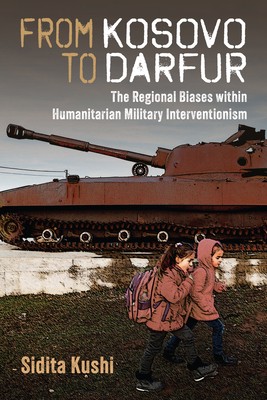
- We will send in 10–14 business days.
- Author: Sidita Kushi
- Publisher: University of Michigan Press
- ISBN-10: 0472077449
- ISBN-13: 9780472077441
- Format: 16.1 x 23.4 x 2.5 cm, kieti viršeliai
- Language: English
- SAVE -10% with code: EXTRA
Reviews
Description
Why are some violent crises more likely to prompt humanitarian military interventions than others? Conventional wisdom says that humanitarian military interventions occur due to national interests, shared values and norms, or economic benefits for the interveners. Yet neither of these factors can fully explain the selectivity of such interventions. The international community continues to ignore the decades-long suffering in Darfur, often dismisses the genocidal policies within Myanmar, and even perpetuates the suffering in contemporary Yemen, while undertaking humanitarian-laden missions in Libya, Syria, and the Balkans.
Using new data on all post-Cold War internal armed conflicts matched to third-party responses as well as in-depth case studies, From Kosovo to Darfur offers the first regionally sensitive analysis of humanitarian military intervention since the end of the Cold War. It shows that international military interventions in the context of acute humanitarian crises are driven by different pathways within the Western versus the non-Western world and fueled by elite perceptions of the crisis, making interventions closer to the geographic and cultural West most probable and most intense. As our international community becomes increasingly interdependent and aware of human suffering across borders, From Kosovo to Darfur points to new pathways of conflict trajectories and offers vital implications for leaders, scholars, and nongovernmental actors advocating for or against international military intervention as a policy choice.EXTRA 10 % discount with code: EXTRA
The promotion ends in 23d.01:26:39
The discount code is valid when purchasing from 10 €. Discounts do not stack.
- Author: Sidita Kushi
- Publisher: University of Michigan Press
- ISBN-10: 0472077449
- ISBN-13: 9780472077441
- Format: 16.1 x 23.4 x 2.5 cm, kieti viršeliai
- Language: English English
Why are some violent crises more likely to prompt humanitarian military interventions than others? Conventional wisdom says that humanitarian military interventions occur due to national interests, shared values and norms, or economic benefits for the interveners. Yet neither of these factors can fully explain the selectivity of such interventions. The international community continues to ignore the decades-long suffering in Darfur, often dismisses the genocidal policies within Myanmar, and even perpetuates the suffering in contemporary Yemen, while undertaking humanitarian-laden missions in Libya, Syria, and the Balkans.
Using new data on all post-Cold War internal armed conflicts matched to third-party responses as well as in-depth case studies, From Kosovo to Darfur offers the first regionally sensitive analysis of humanitarian military intervention since the end of the Cold War. It shows that international military interventions in the context of acute humanitarian crises are driven by different pathways within the Western versus the non-Western world and fueled by elite perceptions of the crisis, making interventions closer to the geographic and cultural West most probable and most intense. As our international community becomes increasingly interdependent and aware of human suffering across borders, From Kosovo to Darfur points to new pathways of conflict trajectories and offers vital implications for leaders, scholars, and nongovernmental actors advocating for or against international military intervention as a policy choice.

Reviews